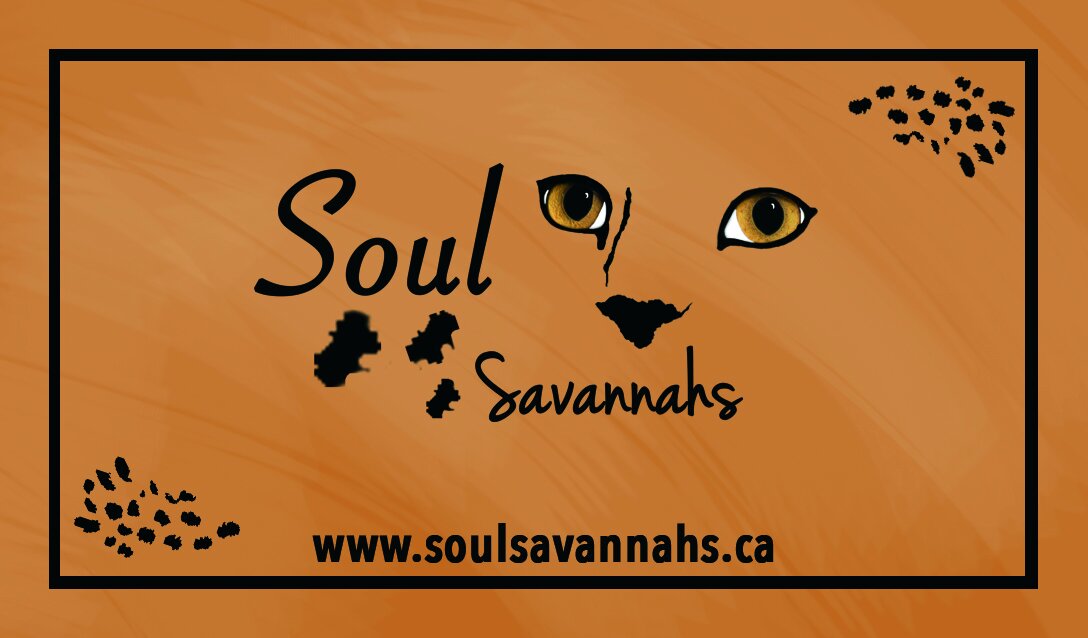Savannah Breeding With Emily Aljober of SOUL SAVANNAHS
Zuko F2B 5.5 years old of AllEarz Savannahs, Nevada
How'd you come up with your cattery name of Soul Savannahs?
What I've always loved most about our breed is the intensity through their energy, loyalty, and love. The connection a Savannah has when looking at their person is like staring into their soul. The iris in my logo is actually a real iris cut out of a quality photo of my first Savannah. The name came to me very quickly, and I knew instantly it was the one. I always try to capture their personality and that loving stare, and some of my favorite photos now are the ones that have my silhouette in their eyes.
One of my legs has tiger stripes, the other is white. You see, I'm unique.
F3C Soul Savannahs Olette - Eyes are the Windows to the Soul
Headed to the Spring 2017 Canadian Pet Expo
Bringing F2B Zuko home from Las Vegas
Please tell us a little bit about yourself, your background, family, occupation.
In high school, we had a few tabbies, my mother never spayed, who'd escape (they were also declawed as I didn’t know better at that time). I'd end up raising, vetting, and homing many litters, experiencing cutting umbilical cords, failing kittens, etc. I enjoyed the entire process, especially birthing.
When I discovered the Savannah, I became obsessed for months, and I researched and learned everything I could. I struggled to find an F2 breeder willing to ship. Finally, I found Trish from Allearz Savannahs, who worked with me to complete Fish and Wildlife and CITES to fly from Ontario, Canada to Nevada, US, to meet her and her wonderful family. Seeing the love and commitment these breeders have, I knew I'd breed one day.
After meeting my other mentor and now great friend (Christine from Savvy Paws) at a pet expo, I became involved with cat shows, educating and introducing the breed to the public. She inspired me to learn about our breed standard and develop a huge respect for quality SBT’s, carefully bred down, to improve the breed.
When I started breeding, I was also working full-time selling phones at Costco. But now, I work from home, along with my raw pet food business (Soul Raw) and a third interconnected business with my boyfriend. We live on a beautiful rural property, allowing me to focus on doing what I love. We're building it together, hands-on, and taking our time to do things right, looking with pride at what we've accomplished.
How’s your family involved in your cattery?
I'm fortunate to have so much support from my friends and family. Many of my best friends are people I've met in this community. My friends always have opted to visit me in my home to hang out while spending time with my babies (rotating room by room usually). My father is very invested in understanding every part of what I do, meets all my cats, and envisions my future goals. My mother's not as invested in the breeding intricacies but loves cats and has rushed to my side with any emergency. She's helped me hand-feed young kittens around the clock, helps me around the cattery so I can have more time with the cats, and pet-sits them when I'm away. I'd been invested in Savannahs a few years before I met my boyfriend, Marcus of Supreme Savannahs. He's pushed me to grow, improve, and supported me in ways that make me a better person and breeder. He understands genetics and which cats complement the other to lock in the right traits. We love to send each other photos of Savannahs we find online, talk about their features, and constructively criticize each other’s cats. We both pay close attention to detail when socializing our cats, and it's incredible to have someone who understands and loves what we do.
A classic Supreme Savannahs kitten pile
What’s a typical day at your cattery like?
I wake up to toys around my neck and in my bed as Olette has brought a few to play fetch the night before. At this point, she's in snuggle mode and excited I'm awake. I then make my way to the kitchen, where Zuko is ready to maul me with love because he's hungry and extra sucky. I feed all my cats and scoop their litter boxes one by one - chatting with them, as they're involved with everything I do as I tidy their rooms. When all the quick tidies are done and dishes are put in the sink to soak, I finally get ready and take care of myself. I try to give each cat some one-on-one time, but if it isn’t possible that day, I make sure to spend extra time with one each day to enjoy them and have special moments. It also allows me to get some good photos once they settle down. I do my rounds several times a day and again before I leave to go anywhere. I'm often a few minutes late to any destination, as the cats get every last minute of my time. A huge percentage of running a cattery is cleaning, but I won’t bore you with that shpiel. You clean, and then you clean again.
What's the best part about breeding?
Placing healthy social cats with their matching loving homes is the best part of breeding. Many of my pet homes are still in contact and have a great relationship with me. I love watching every unique personality develop and working with them to be confident and adaptable to change. It's incredible to see both physical and personality quirks passed down from each parent (even if they've never met before).
What's the worst/hardest part about breeding?
Beyond the obvious--fighting for little lives and dealing with new challenges that come with living creatures--dealing with people is the hardest. People don’t realize what an expensive hobby breeding is. They don’t realize the time, sweat, and tears put in behind the scenes--the hours talking to tire kickers or people who ask for advice but don’t actually want it. Many people think breeding's simply putting two cats together. But many elements come with being a breeder: housing, health, diet, socialization, marketing, etc.
Do you recommend people try breeding Savannahs? Why/Why not?
I recommend breeders to breed Savannahs for the right reasons, and then it'll always be worth it. Don't breed to make money, as many lose tens of thousands of never break even—breed to improve the breed and not just put two cats together for cute kittens. I recommend newbies own a Savannah, attend a cat show, learn the breed standard, find mentors, and learn all they can. Accept advice and listen to the bad from experienced breeders. Let the hardest parts motivate you to do it correctly. We need more quality breeders to continue improving our breed. Breeding's very rewarding if you do it for the right reasons.
What's the best tip(s) or advice you've received from another breeder?
“Be Humble.” There's more than one way to do things. Instead of judging, be open to learning and focus on improving your program.
“Always have big emergency savings ready.” Something will come up costing thousands of dollars from c-sections to accidents, etc. Be ready.
“Do comprehensive health testing and quarantine before bringing a new cat into your program.” It only takes one time to compromise all your cats, cost you thousands, or compromise your reputation.
“Do housing right the first time.” It's much work to maintain a cattery. Breeding cats spray and destroy things due to their hormones. It's better to invest and consider all the factors the first time versus spending a lot of money and time to repair and improve your setup.
“Start small.” Be very picky and start with 2-3 cats. Have a couple of litters and see how they develop. Get to know your cat's strengths and weaknesses. Decide how to improve and add cats to your program to complement what your cats need.
“Have more housing than the number of cats you have.” You need spaces for quarantining new cats, sick cats, separating bad moms from their kittens, separating kittens from their moms or siblings to socialize one on one. Separate breeding cats so they don't breed unintentionally, and keep cats in small groups for less stress and fewer illness chances.
“Always watch their body language and have a broom, towel, or blanket ready.” Studs and even queens can snap and act differently to other cats, strangers, or even you because of their hormones. Be ready to separate a fight at all times so no one gets hurt. It's your responsibility to know better and be aware.
What's the biggest weakness of the Savannah breed?
The biggest weakness is breeding out unwanted locked-in traits from outcrosses (like Bengals) used in the past. It is disheartening that pet homes and even breeders think it's still good to mix the two. The two breeds are individually amazing but opposite in every way. It's tough to correct down the line.
What's the biggest strength of the Savannah breed?
We have a young and very healthy breed with a genetically diversified pool. Savannahs are the perfect mix of an exotic look in a domestic package, with outgoing, doglike personalities.
What's the most important thing a breeder does?
The most important thing a breeder can do is produce healthy and social kittens, maintain happy breeding cats, and always learn and improve from any source and in any way you can. A breeder that provides lifetime support and stands behind their cats will always try to do right by their cats first and foremost, and of course, be fair to their homes.
What should new breeders know about breeding they probably haven't considered?
Females can pee more than males. It's a yellow massacre when the girls are in heat. Cats yowl, and some have hormonal aggression. Vets don’t always have the answer.
I understand you’re well-versed with raw feeding. What’s your best advice?
Raw's not as difficult or expensive as many people think, but it's also not as simple as giving them a piece of chicken. Cats need 80% muscle meat, 10% secreting organ (minimum 5% liver), and 10% bone. Cats have acidic stomachs and shorter digestive tracks than carnivores and won't get sick or pierce their stomachs with the raw bone (it's actually quite soft). It's not ideal for feeding kibble, wet and/or raw, at the same time, as they digest at different rates. Cats get 90% of their moisture by nature from their diet, are obligate carnivores, and can't process grain or veggies. Every protein and cut of meat has its own unique nutritional profile, so variety is best. The whole prey is completely balanced and great for the lazy human. Lastly, if you've never given raw before or whole prey, they likely won't see it as food. I suggest tuning into my "Soul Raw" series to learn more tips and tricks to transition if they don’t naturally go for it. It isn’t always easy, but the benefits are well worth it in the end!
If not raw feeding or supplementing, what food brands/types do you recommend?
If not raw, I first suggest freeze-dried or air-dried (Primal or Ziwi Peak) and then recommend a minimum 50% wet diet with limited ingredients and grain-free like Weruva or Almo, and kibbles like Farmina or Boreal.
With any diet, I suggest a good 3-6-9 oil for their eyes, skin, and coat. Preferably a squeeze bottle like Thrive as pump bottles degrade the oil.
Do you have a favorite Savannah Cat website?
Facebook has a huge community and a plethora of information. My favorite groups include "Hooked On Savannahs" (focus is no advertising, but educating and admiring the breed). "Savannah Cat TICA Breeders," "Canadian Savannah Cats," and "SBT Savannah Kittens and Cats."
Do you or have you bred any other type of cat or animal?
Only breed cats, but I own snakes and parrots. I love all animals and caring for them as close to how they'd be found in nature.
What do you think about the phasing out of F1 Savannahs?
I think it'll be a detriment to our breed as we're still developing and too young. We're starting to develop proper late generations that should now be used back to the serval and bred down again to SBT to lock in desirable traits. I also don’t think TICA is the be-all and end-all. People will still breed for F1’s, whether it is backyard breeding or using another registry/pedigree system. This impacts the people who're trying to do things correctly more than anyone else.
What about F2s and F3s being phased out?
It's heartbreaking, as early generations have their own charm and can make incredible pets. Adding more outcrosses to our breed or limiting the breed pool at this point will only compromise the look and health of our cats.
What else would you like the Savannah world to know about you and your cattery?
This breed is my life and passion, and my cats are the legacy I'll leave behind one day. It's vital to me to select the right match for my pet homes, be selective before placing breeding cats (very few and far between), and always breed to improve and develop the breed.
BEFORE YOU GO, WE NEED YOUR HELP TO MOVE UP THE RANKS ON GOOGLE!
Help SAVANNAHGANS® Grow and Reach Every Savannah Cat-Owning Household! All support is humbly appreciated (visit the clickable underlined links).
Subscribe (free) (by visiting the banner on our home page) and receive each quarterly issue to your inbox.
Share this article on your own social media platforms.
Leave a Comment. (this is VERY helpful to our growth and Google recognition)
Follow on Instagram.
Follow on Twitter.
Follow on Pinterest.
Follow on Youtube.













